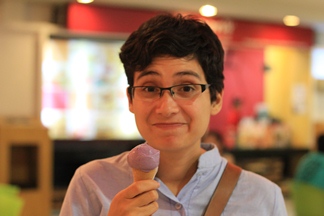 Whenever I told Filipinos I was researching Filipino fast food on a Fulbright grant, they would laugh twice. First, they would laugh at how funny and ludicrous my topic sounded. Then, they would laugh again, because fast food, and food in general, is such an obvious part of their everyday lives. Then they would start to tell me their fast food stories: their memories of the Jollibee commercial “I Love You Sabado,” their favorite McDonald’s order, their family celebratory traditions, their theories as to why certain foods were embraced by Filipino culture.
Whenever I told Filipinos I was researching Filipino fast food on a Fulbright grant, they would laugh twice. First, they would laugh at how funny and ludicrous my topic sounded. Then, they would laugh again, because fast food, and food in general, is such an obvious part of their everyday lives. Then they would start to tell me their fast food stories: their memories of the Jollibee commercial “I Love You Sabado,” their favorite McDonald’s order, their family celebratory traditions, their theories as to why certain foods were embraced by Filipino culture.
I noticed that when Filipinos talk about their cuisine, they’re not talking about only food. Embedded in every interview I conducted was a discussion of memory, of gathering, of a Filipino identity, shifting and constant all at once. It didn’t matter what station in life Filipinos occupied, whether they were drivers, businesswomen, CEOs, food experts, students, or housecleaners. Fast food has deep, daily, emotional and cultural implications for Filipinos, and they were eager to share their interpretations with me, a relative outsider. If I could name the simplest, deepest impact my presence had in the Philippines, it was as a listener. I could sense how important it was for Filipinos to feel heard, and I was honored to help represent their stories and relationships to fast food.
As I went through the process of scheduling interviews with Filipinos from various walks of life, I gained much more confidence as a nonfiction writer. It was helpful to have nearly daily practice at interviewing various food writers, food entrepreneurs, and everyday workers of all ages and walks of life. It also gave me a fascinating overview of Filipino society, a complex culture that is both welcoming and challenging in a variety of engaging ways. I sensed, too, that Filipinos were always happy for the chance to share with a dayuhan (foreigner) the story of their fast food cuisine, the diverse, accompanying narrative of which reflects the vibrant development and history of the Philippines itself.
If you’re a research/study applicant interested in the Philippines, look closely at what in your professional and recreational background makes you ready for the research you want to do. I’ve always been fascinated by what food represents beyond a functional meal, as far as the identity and the story of a people, and I wrote about restaurants and food during my post-undergraduate life in New York City. In my free time, I also volunteered at supper clubs and ran food events for an overseas charity. What about your background, interests, and daily work prepares you for your Fulbright research? Everyone has their own compelling narrative. The Fulbright Program is an opportunity for you to honor and build on it.
Photo: Laurel Fantauzzo, 2010-2011, Philippines, eats a quick ube ice cream cone in Quezon City, Philippines, as part of her research for Jolli Meals: The Rise of Filipino Fast Food

